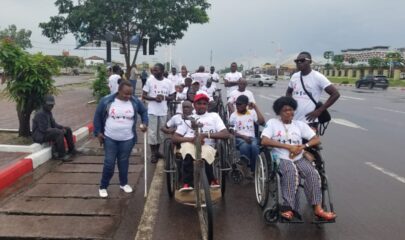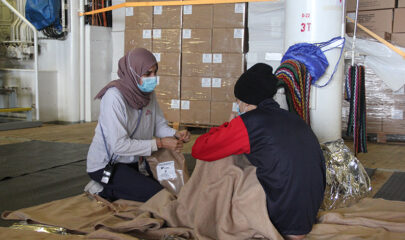
© Igor Barbero / MSF
At its core, Doctors Without Borders/Médecins Sans Frontières (MSF) is deeply rooted in a global movement of solidarity and strength. Beyond the provision of medical care, we stand together with people facing crises and recognize our shared humanity.
My colleague Dr. Hager Saadallah’s words resonate. A psychologist aboard the MSF search and rescue vessel on the Mediterranean Sea, she says : “We are here to stand with survivors as they ask for their stories to be told. We don’t want to turn away.”
We have learned over time to speak out about our work not just to draw the world’s attention to crises, but to stand with our patients, colleagues and their communities who are facing these emergencies firsthand.
This often means sharing people’s experiences in their own words, like Nur Boshor’s*, a Rohingya refugee in Bangladesh working with MSF, whose story you can read in this issue. We recognize and seek to understand the violence, repression, profound inequity and deliberate neglect that drove Nur Boshor and so many others to seek support. Acting in solidarity means looking beyond the wound to the whole person. It demands not only our medical competence, but our empathy and our awareness.
In Democratic Republic of Congo, our solidarity means being more deliberate about engaging with communities, working with them in partnership as the owners of their health needs and co-creators of solutions. We believe sharing responsibility for healthcare delivery will lead to earlier, more tailored, better trusted and longer-lasting health services, even in this volatile context.
On the Mediterranean Sea, we express our solidarity through search and rescue activities as well as providing medical assistance to people who are rescued. And even more so through exposing the hypocrisy of European governments that trumpet human rights and refugee law while acting contrary to those conventions by systematically choking off the means for people to seek safety, at times leaving them to drown. MSF’s current vessel, the Geo Barents, where Dr. Saadallah works, is as much a floating rescue clinic as a symbol of protest.
“Being in solidarity means MSF puts the people we work with at the centre of everything we do and joins their struggle. ”
Through our Inclusion of People with Disabilities program, MSF is adapting our work in recognition that emergency humanitarian action frequently overlooks how people living with disabilities may not have the same level of access to assistance. We aim to embed ways of accommodating people of all abilities in all our operations.
Being in solidarity means MSF puts the people we work with at the centre of everything we do and joins their struggle. It is our shared humanity that brings you and our global community of supporters together to stand with people facing crises all over the world.
It is this way of connecting and standing together with people – even more than the medical care we provide – that fuels the spirit of the MSF movement that you and I are a part of.
PLEASE DONATE NOW
We are asking you to stand with crisis-affected communities again today. If you are able, please donate now to help us continue offering emergency medical care to people who need it most. Thank you for your support
*Name changed to protect privacy.
MSF IN ACTION

Eswatini. With COVID-19 vaccination coverage at around 28 per cent in Eswatini as of February 2022, MSF is supporting the Ministry of Health’s campaign to increase coverage, vaccinating people in remote communities. Most rural communities lack health facilities or vaccination points, and public transport is limited. As the country faces a dual HIV/tu- berculosis epidemic, there is a lot of fear and stigma around COVID-19 and many people are hesitant to get vaccinated. MSF teams engage in health promotion activities to dispel myths and provide accurate information. This includes going door-to-door to share infor- mation about COVID-19 and encouraging people to get vaccinated at mobile vaccination sites. In two weeks, MSF mobile teams administered 7,025 doses of COVID-19 vaccines.
Philippines. Following assessments carried out between December 2021 and early January 2022, MSF teams began providing medical and humanitarian assistance to communities on the remote islands of Dinaga, Siargao and other outlying areas, some of the worst affected by Typhoon Rai (known locally as Odette). The typhoon struck the Philippines in December, causing hundreds of casualties. The affected regions have an estimated combined population of over 240,000 people. In cooperation with the
response from Philippine authorities, MSF has supported health facilities running mobile clinics in isolated areas, facilitated referrals of critical patients, distributed relief items and donated essential medical materials.
Yemen. An air strike carried out by the Saudi-led coalition on Sa’ada City Remand Prison in the early hours of Jan. 21, 2022 killed at least 82 people and injured 266, according to the Ministry of Health. The coalition has regularly bombed areas under Ansar Allah control since 2015 and has hit MSF and MSF-supported hospitals five times, along with many other civilian targets. MSF organized donations of medical equipment to al-Gumhourriyeh Hospital in the immediate aftermath of the air strike and sent a truck with more donations from Sana’a the same day. MSF teams worked with the Ministry of Health to further support the hospital to manage the influx of casualties.


